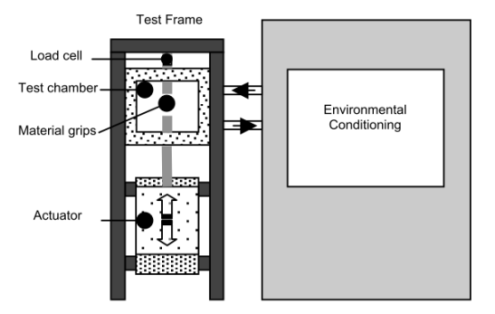Universal Test Machine

Figure 1. Representation of the PSI equipment. Strains are applied by the actuator while the environmental unit maintains the conditioned air in the test chamber.
PSI built and operates a custom universal test machine, which was created to fulfill a specific need for a high-speed tension-compression machine.
The desired features included the ability to perform complex motion profiles while maintaining the temperature and humidity conditions in the test chamber. PSI designed and constructed the test machine. We also developed custom software for the high-speed controls, signal processing, and reporting of test results.
The PSI universal test machine was designed around a linear servo motor, and the custom software can control it to produce complex motions. Velocity, acceleration, and dwell times are programmable at all points during the movement. In the current configuration, the actuator can achieve speeds approaching 2 m/s.
Our test machine was originally built for conditioning and testing natural and artificial polymers in a controlled environment. Having the ability to control temperature and humidity is vitally important for exploring the properties of polymers.
- For instance, the glass transition temperature of cellulose is highly dependant on the moisture content. Therefore in general, it is difficult to determine accurately the properties of a moist paper specimen.
- In a traditional tensile machine without environmental controls, the paper specimen would dry significantly during a slow strain-rate test, and the material properties would change in an uncontrolled manner.
The PSI machine, however, can maintain a stable humidity level while the specimen is being tested.
PSI has operated our custom test machine in house to study the affects of temperature, moisture, and strain rate on polymer materials.
We have performed standard tension, compression, and shear tests, but we specialize in developing non-standard test methods and equipment.
Numerous modifications have been made to the PSI tester to create unique tests.
- Jigs from actual manufacturing equipment have been installed in the tester, and the actuator has been controlled to simulate the motions of the factory machines.
- Multi-stage and cyclic-strain tests have been developed to study several conditions on a single sample.
 Figure 2. Comparison of failure modes for identical specimens at
ambient (left) and 90% humidity (right) under tension at 1.25 m/s.
Figure 2. Comparison of failure modes for identical specimens at
ambient (left) and 90% humidity (right) under tension at 1.25 m/s.
 Related Documentation
Related Documentation